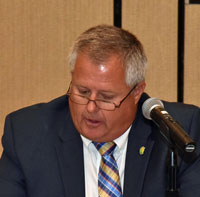![]() Green Plains, Inc. (GPRE) continues its growth with a new joint venture with Jefferson Gulf Coast Energy Partners to construct and operate an intermodal export and import fuels terminal at Jefferson’s existing terminal located in Beaumont, Texas. It’s anticipated that the 50/50 joint partnership investment for Phase I development will be $55 million. The first phase, expected to be finished during the second quarter of 2017, will focus on adding storage and throughput capabilities for multiple grades of ethanol. Going forward, the companies plan on adding capabilities to add other liquids products such as liquid hydrocarbons, vegetable oils and other non-liquid commodities.
Green Plains, Inc. (GPRE) continues its growth with a new joint venture with Jefferson Gulf Coast Energy Partners to construct and operate an intermodal export and import fuels terminal at Jefferson’s existing terminal located in Beaumont, Texas. It’s anticipated that the 50/50 joint partnership investment for Phase I development will be $55 million. The first phase, expected to be finished during the second quarter of 2017, will focus on adding storage and throughput capabilities for multiple grades of ethanol. Going forward, the companies plan on adding capabilities to add other liquids products such as liquid hydrocarbons, vegetable oils and other non-liquid commodities.
“Once completed, we believe this terminal will provide Green Plains and other customers with significant advantages over other locations,” said Todd Becker, President and CEO of Green Plains. “As demand for the products we produce continues to grow both globally and domestically, we want to create a world class solution to service our customers. Access to three Class I railroads, barges and inbound/outbound vessels positions the terminal with transportation and cost advantages that will make this a successful partnership. This terminal will be one of the most modern and efficient solutions in the U.S.”
The joint venture’s terminal will have direct access to multiple transportation options including Aframax vessels, inland and coastwise barges, trucks, and unit trains with direct mainline service from the Union Pacific, BNSF and KCS railroads. GPRE says Phase I development will leverage existing infrastructure at the Jefferson terminal and is expected to include approximately 500,000 barrels of storage with expansion potential of up to 1,000,000 barrels.
“We are excited to be partnering with one of the largest ethanol producers and traders in North America. This project will add the necessary infrastructure at Jefferson Beaumont to distribute ethanol to markets worldwide,” added Greg Binion, President and CEO of Jefferson, a subsidiary of Fortress Transportation and Infrastructure Investors LLC. “Green Plains Trade Group will be the anchor customer of the joint venture, and the terminal is expected to serve other ethanol exporters as well. We are confident that Jefferson’s multimodal capabilities and sustainable cost-advantaged logistics will contribute to the success of this joint venture.”












